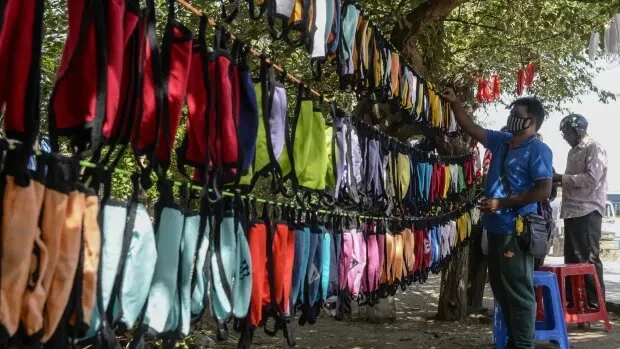The latest:
Britain’s official human rights watchdog is to mount an inquiry into the racial inequalities exposed by the coronavirus pandemic, which has topped 6.6 million cases worldwide and led to more than 391,000 deaths.
The Equality and Human Rights Commission said it was a “once in a generation” opportunity to tackle deep-seated inequalities and create a fairer country. The move follows the publication of a government-commissioned report earlier this week, which found that people from ethnic minorities have died from COVID-19 in larger relative numbers in England than their white compatriots.
The report has faced criticism for not providing any recommendations after not accounting for an array of factors, including occupation, pre-existing health conditions and household densities.
Though the government said it is backing further study, the commission said it will use its statutory powers to investigate.
Its chair, David Isaac, said this is “an important step toward ensuring that the deep-rooted inequality faced by ethnic minorities is meaningfully addressed as we rebuild.”
The U.S. accounts for more than 1.8 million cases of the novel coronavirus, which causes an illness called COVID-19, and more than 108,000 deaths.
As of 7:30 a.m. ET Friday, there were 93,726 confirmed and presumptive coronavirus cases in Canada, with 51,739 cases considered recovered or resolved. A CBC News tally of deaths based on provincial health data, regional information and CBC’s reporting stood at 7,699.
Here’s a look at what’s happening with COVID-19 in Canada
While most cases are mild to moderate, some people — including the elderly and people with underlying health issues — are at greater risk of severe illness and death.
Dr. Theresa Tam, Canada’s chief public health officer, said on Thursday the country has been successful at slowing the spread of COVID-19, but warned that relaxing public health restrictions too quickly could lead to a rampant resurgence of the disease.
Tam said most of the country has seen spread of the disease diminish substantially, but there remain hot spots of community transmission in Toronto and Montreal that are concerning. In the last two weeks, Ontario and Quebec accounted for 90 per cent of new cases, and most of those were in those two cities.
Read on for a look at what’s happening around the world.
Pakistani authorities backed by security forces shut down more than 3,000 shops and markets across the country in a series of raids for violating physical distancing regulations, after COVID-19 cases surpassed those in China.
The virus has spread at a fast pace since Prime Minister Imran Khan eased a lockdown in May. Pakistan on Friday reported 68 more coronavirus-related deaths, raising its overall fatalities to 1,838. As many as 4,896 more people tested positive in the past 24 hours, the highest single-day infections, bringing the overall total to 89,249.

Medical workers are bracing for a surge of COVID-19 patients and some hospitals are turning back those with mild infection, asking them to quarantine themselves at home.
Critics blame Khan for easing restrictions prematurely. The government says the virus spread because people did not adhere to physical distancing regulations.
India on Friday registered more than 9,800 new cases of the coronavirus in another biggest single-day spike. The Health Ministry said the total number of confirmed cases hit 226,770, with 6,348 deaths, 273 of them in the past 24 hours. The overall rate of recovery is around 48 per cent.
There has been a surge in infections in rural areas following the return of hundreds of thousands of migrant workers who left cities after the lockdown in late March.

Prime Minister Narendra Modi also announced India’s contribution of $15 million US to the international vaccine alliance during his address to the virtual Global Vaccine Summit hosted by British Prime Minister Boris Johnson on Thursday.
Modi said the COVID-19 pandemic has exposed the limitations of global co-operation and that for the first time in recent history, the world faces a clear common enemy.
South Africa has seen its largest daily jump in new coronavirus cases. The 3,267 new cases bring the country’s total to 40,792. More than 27,000 of those are in the Western Cape province centred on the city of Cape Town.
South Africa has the most virus cases in Africa, where the total number is now above 163,000.
The continent still represents less than three per cent of the global total of cases, but South Africa and Egypt are hot spots, and Nigeria, Africa’s most populous country, is another growing concern with more than 11,000 cases and relatively little testing for the virus.
Shortages of testing and medical equipment remain a challenge across the 54-nation continent, where just 1,700 tests are being carried out per one million people.
Brazil has reported 1,473 more COVID-19 deaths, the biggest 24-hour increase in the country’s death toll since the outbreak began. That’s equal to more than one death per minute, and means the country now has the world’s third-highest death toll.
WATCH | Are you making these mask mistakes?
For the second straight night, the health ministry delayed release of Thursday’s data until 10 p.m. local time, after Brazil’s widely watched evening news program ended. Thursday was the third straight day with a new daily high for Brazil’s coronavirus deaths.
Brazil has reported more than 34,000 deaths from the virus so far, meaning it surpassed the amount in Italy and trails only the U.K. and U.S. Experts consider the tally a significant undercount due to insufficient testing.
South Korea has reported 39 new cases of the coronavirus over a 24-hour period, a continuation of an upward trend in new infections in the country. The additional figures released Friday by the Korea Centers for Disease Control and Prevention took the country’s total to 11,668 cases, with 273 deaths.
The agency says 34 of the additional cases were reported in the densely populated Seoul metropolitan area, where about half of South Korea’s 51 million people live.

South Korea has seen a rise in the number of new cases after easing much of its rigid physical distancing rules in early May. But the caseload hasn’t exploded, unlike when the country reported hundreds of new cases every day in late February and early March
Muslims in Indonesia’s capital held their first communal Friday prayers as mosques closed by the coronavirus outbreak for nine weeks reopened at half capacity. Authorities checked temperatures and sprayed hand sanitizers at the entrance to the mosques, and police and soldiers ensured the faithful observed physical distancing and wore masks.
Worshipers were asked to bring their own prayer rugs and were expected to stay at least one metre apart with no handshaking. Sermons were shortened.

Indonesia has reported 28,818 confirmed cases and 1,721 fatalities.
President Joko Widodo said his administration wants Indonesia’s economy back on track but safe from the virus. The government is gradually deploying 340,000 security personnel to enforce health rules as the country gradually lifts restrictions by the end of July.
Fiji has declared itself free of the coronavirus — at least for now — after all 18 people who tested positive have recovered. Prime Minister Frank Bainimarama said Friday that the South Pacific island nation had just cleared the last of its active patients.
He wrote on Twitter: “And even with our testing numbers climbing by the day, it’s now been 45 days since we recorded our last case. With no deaths, our recovery rate is 100 per cent.” He went on: “Answered prayers, hard work, and affirmation of science!”
Fiji, which has a population of 900,000, imposed a lockdown in certain areas in April and put in place ongoing border restrictions.
Source link


Be First to Comment